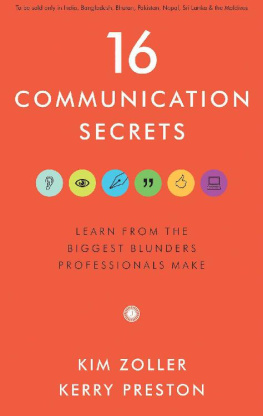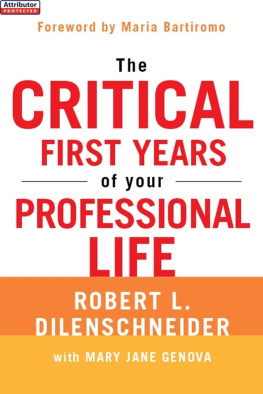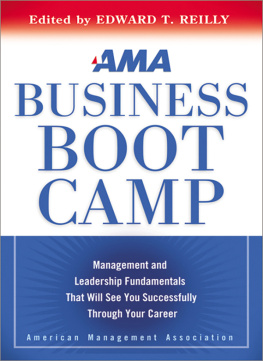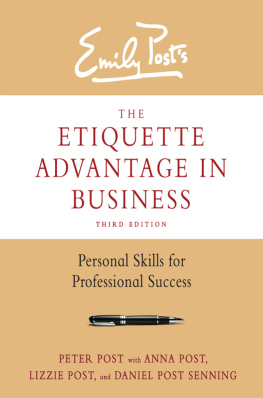We started this book many years ago with the simple goal of offering something that wasnt on the market. We wanted to provide a quick and easy reference guide for a business community that didnt have time to read an in-depth etiquette book.
Many thanks to our wonderful clients and seminar participants for asking valid questions. Through their active participation, this book was written with them and their colleagues in mind.
We want to thank our team for their input and excitement regarding this project. We have an amazing support team and could not have accomplished this without them.
We thank the creativity of Andrew Grossman and Roger Pennwill for their wonderful cartoons.
We thank and acknowledge Ben and Sam Zoller and Tim, Luke, Wes, and Nate Reinagel, all of whom gave us many hours of quiet to let us complete this book. We also thank our parents for all of their support through the years.
Introduction
There is no accomplishment so easy to acquire as politeness, and none more profitable.
George Bernard Shaw
Successful people leave nothing undone. To them, every detail matters. In many instances, success is determined by interpersonal skills rather than technical skills. After analyzing the records of 10,000 people, the Carnegie Institute of Technology concluded that only 15 percent of job success is due to technical training, intellect, and job skills, and 85 percent of job success is due to personality factors. In other words, job success is determined, in greatest measure, by ones ability to effectively work with other people.
Harvard Universitys Bureau of Vocational Guidance conducted a study of thousands of men and women who had been fired. The study showed that for every one person who lost a job for failure to do work, two people lost jobs for failure to successfully deal with other people.
Setting yourself apart in todays highly competitive business environment takes thought and planning. To be a truly professional and successful individual in the workplace, not only must you have excellent job skills, but you must have excellent people skills as well.
There is nothing worse than walking into a situation and not knowing how it should be handled. Professionalism is expected and respected. Lack of professionalism can ruin your career. You Did What?! is about making sure that your mistakes do not get in the way of your career. Nothing goes unnoticed. Dont bring your career to a halt without even realizing it. Walk into every situation feeling confident. Dont ever be in a situation in which you are recounting an interaction and have someone say, You did what?!
1 Big Blunder
Forgetting to Stay One Step Ahead
Behavior is a mirror in which everyone displays his own image.
Johann Wolfgang von Goethe
Impressions are made in seconds. Most of the time, these impressions determine the outcome of a situation before the actual interaction begins. Weve all heard the saying, You dont get a second chance to make a first impression. People tend to focus on small things that can affect your future.
Research has confirmed the importance of first impressions. Most businesspeople determine if they want to do business with you based on these first impressions. By planning ahead, you can decide what you want your image to be and what impressions you would like to leave others with. This gives them every opportunity to do business with you, hire you, and be loyal to you.

In an ideal world, others would not judge us. In the professional world, judgments are made and impressions happen within seconds of first meeting someone. It is important to take time to think about first impressions and how others perceive us. Some aspects of first impressions include posture, body language, appearance, and your personal style. If done right, this can play a role in forming favorable impressions that will go a long way toward building your career.
There are three basic components that contribute to a others impression of us:
 The words we use make up 7 percent of an impression.
The words we use make up 7 percent of an impression.
 The way we sound, that is, our intonation and enunciation make up 38 percent of an impression.
The way we sound, that is, our intonation and enunciation make up 38 percent of an impression.
 Our nonverbal messages and our body language make up 55 percent of an impression.
Our nonverbal messages and our body language make up 55 percent of an impression.
These components determine how others perceive us and how they react to us. Being one step ahead means leaving nothing to chance. You must perfect the details of how you present yourself. Think about the people you know who are successful and professional.
Ask Yourself These Crucial Questions
 What makes the people I admire professional?
What makes the people I admire professional?
 What did I learn from them that can help me become more professional?
What did I learn from them that can help me become more professional?
 How do I want people to perceive me?
How do I want people to perceive me?
 What image do I want to project?
What image do I want to project?
On the Side
Recently, we were selecting a vendor to furnish our new office. We couldnt believe the treatment we received. Some vendors acted as though they were doing us a favor. Others arrived a few minutes late to our first meeting. We hired the vendor who had the most professional peoplethe people who treated us well and acted as though they were thrilled to be with us. They were willing to do whatever it took to make us happy. Its a pity that the other vendors overlooked the possibilities. It turned out to be $100,000 worth of business.
















 The words we use make up 7 percent of an impression.
The words we use make up 7 percent of an impression. What makes the people I admire professional?
What makes the people I admire professional?